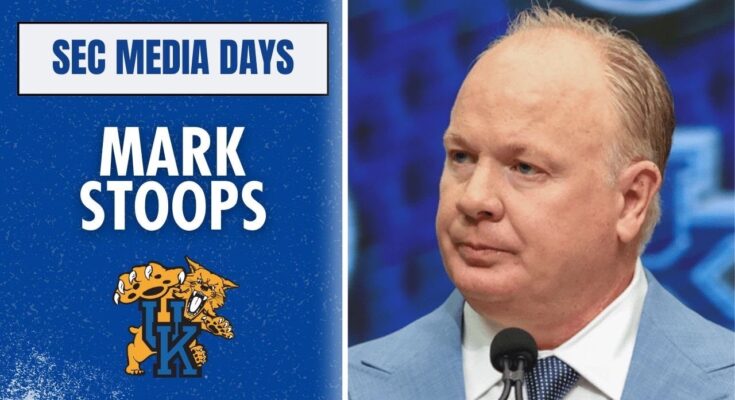Inside Mark Stoops’ Mission to Revive Kentucky’s Edge: Can the Wildcats Reclaim Their Hard-Nosed Identity?
Mark Stoops has never been one to shy away from a challenge. When he took the reins of Kentucky football over a decade ago, the Wildcats were an afterthought in the Southeastern Conference—a league that devours mediocrity and leaves no mercy for programs without a defined identity. Stoops, however, built something rare in Lexington: a culture of toughness, accountability, and relentless effort that not only made Kentucky competitive but turned it into a respected force in the SEC. That foundation didn’t happen overnight. It was forged through years of grinding, demanding discipline from every player, every coach, every snap. And now, as the 2025 season looms, Stoops finds himself on a mission to bring that edge back to a program that, in his view, has drifted away from its core values.
For Stoops, discipline isn’t just a word tossed around in motivational speeches; it’s the lifeblood of his philosophy. It shows up in practice habits, in attention to detail, in the ability to execute when the pressure is suffocating. It’s what turned Kentucky from a perennial SEC cellar-dweller into a team capable of winning 10 games and taking down giants. That disciplined culture became the Wildcats’ identity, the thing that separated them in a league dominated by blue-blood programs with endless resources and historic pedigrees. It was never about out-recruiting Alabama or Georgia; it was about out-working them, out-preparing them, and refusing to beat themselves.
But in recent seasons, cracks have started to show. Kentucky has still won games, still produced NFL talent, still remained relevant. Yet the sharpness—the ruthless attention to detail that once defined the program—hasn’t always been there. Missed assignments, costly penalties, and lapses in execution have crept in at critical moments. For a team that built its success on minimizing mistakes and maximizing effort, those slip-ups are more than just stats on a sheet—they’re symptoms of a deeper issue. Stoops knows it, and he’s not sugarcoating it. If Kentucky wants to compete with the SEC’s elite, if they want to move beyond respect and into true contention, they have to get their culture back on track.
Rebuilding that discipline starts with accountability, and Stoops has been vocal about resetting expectations. He understands the modern landscape of college football better than most. With NIL deals, the transfer portal, and an ever-evolving rulebook, maintaining a unified culture is harder than ever. Players have more freedom, more leverage, and more distractions than any generation before them. But Stoops isn’t using that as an excuse. In his eyes, these challenges make discipline even more essential. When the outside noise grows louder, the internal structure has to grow stronger. That means holding players responsible not just for their performance on Saturdays, but for their habits every single day.
To understand why Stoops is so passionate about this cultural reset, you have to look back at the identity that made Kentucky successful under his leadership. The Wildcats weren’t just tough—they were fundamentally sound. They played clean football. They won the line of scrimmage. They didn’t beat themselves with penalties or mental errors. Those traits didn’t make headlines, but they won games in the SEC, where the margin for error is thinner than a blade of grass. When you’re facing rosters stacked with five-stars and future first-round picks, discipline becomes your equalizer. It allows you to hang in games, to outlast opponents, to turn opportunities into wins. That was the Stoops formula, and it worked.
Somewhere along the way, that formula has been diluted—not abandoned, but diluted. Kentucky has recruited better athletes, modernized its offense, and leaned into the high-octane world of college football, which isn’t a bad thing. But with that evolution came a subtle shift away from the foundational principles that built the program. Stoops sees it, and it eats at him because he knows what’s possible when Kentucky plays with laser focus and discipline. He knows that this team doesn’t have to settle for middle-of-the-pack finishes. He’s proven that the Wildcats can win in this league, even against the big dogs. But only if they reclaim what made them different.
The road back starts on the practice field, where Stoops has reportedly intensified the focus on fundamentals. This isn’t about gimmicks or motivational slogans; it’s about reps, precision, and effort. It’s about demanding excellence in the smallest details so that excellence becomes second nature when the lights are brightest. Stoops has always been a defensive-minded coach, and his best teams reflected that personality—physical, disciplined, and unyielding. If he has his way, that mentality will define Kentucky again.
But discipline isn’t just physical—it’s mental. It’s about players buying into a standard, even when no one is watching. It’s about leadership in the locker room, about veterans setting the tone and young players falling in line. Stoops knows he can’t do it alone. Coaches can preach culture, but players have to live it. That means finding and empowering leaders who aren’t afraid to hold their teammates accountable, who understand that wearing Kentucky blue comes with a responsibility that goes beyond personal stats or NIL deals. Stoops is counting on those voices to emerge because they’re the ones who can keep this team aligned when adversity hits.
The stakes couldn’t be higher. The SEC isn’t waiting for Kentucky to figure things out. Georgia is a juggernaut, Alabama remains Alabama, and programs like Tennessee, LSU, and Ole Miss are surging. If the Wildcats take a step back, they risk fading into the noise of a league where irrelevance comes quickly and mercy doesn’t exist. Stoops refuses to let that happen. He’s too competitive, too proud, and too invested in what he’s built to watch it erode. That’s why this push for renewed discipline feels so urgent—it’s not just about 2025. It’s about the trajectory of the program for years to come.
There’s also a personal dimension to this mission. Stoops has been at Kentucky longer than most believed possible when he took the job. He’s weathered storms, turned doubters into believers, and rewritten what this program can be. But legacy is fragile in the SEC. One bad stretch, and the narrative shifts. Stoops isn’t chasing headlines or approval; he’s chasing fulfillment—the kind that comes from knowing you built something that lasts. For that to happen, Kentucky has to win, and for Kentucky to win, discipline has to return to the forefront.
Fans sense it, too. They’ve tasted success under Stoops, and now they’re hungry for more. They want to believe this team can challenge the best, that it can turn 10-win seasons into something greater. They know the Wildcats may never recruit like Georgia or Alabama, but they also know what they saw in those breakthrough years: a team that refused to flinch, that played smarter and harder than its opponents. They want that team back, and Stoops intends to give it to them.
The coming months will tell whether that vision becomes reality. It won’t be easy. Discipline isn’t a switch you flip—it’s a habit you build. It takes time, consistency, and buy-in from every corner of the program. But if Stoops has proven anything in his tenure, it’s that he understands the long game. He’s not afraid of the grind. In fact, he thrives on it. That mindset turned Kentucky into a contender once, and it might just do it again.
For now, the message in Lexington is clear: the Wildcats are going back to their roots. They’re going back to the identity that made them dangerous, back to the culture that gave them a seat at the SEC table. And if they succeed, Kentucky won’t just be a tough out—they’ll be a team that no one wants to see in November. That’s the vision driving Stoops today, and if history is any guide, you’d be wise not to bet against him.



